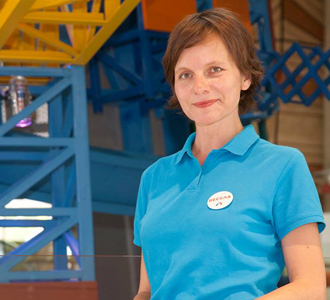She is an archaeologist and her vocation is to work for and with kids. She dreams on creating spots across Bulgaria which can help them preserve their curiosity towards the surrounding world longer. Each new project makes part of that dream come true. She wants to turn dull everyday places into inspiring spots for children, so that we can take them to the bank, drug store, local shop or library without having to explain to them that they should “behave themselves”. We should give them a chance to comprehend our everyday life, to make them part of it and the latter to serve as inspiration for their training. Because kids would learn all the time if it wasn’t for our restrictions.
Her name is Vessela Gercheva and she is the program director of the Muzeiko children’s educational center. In the course of 10 years she has been developing different dimensions of that project and also its small prototypes with traditional Bulgarian museums.
 “Children’s corners across museums are a project, funded by the America for Bulgaria Foundation and we created 6 of those within its frameworks. Our ambition was to show that there was place for children at the museums and the latter are not dull and full of some dusty objects – they are breathing places which can inspire with scientific research and the things that the teams are working on really actively.”
“Children’s corners across museums are a project, funded by the America for Bulgaria Foundation and we created 6 of those within its frameworks. Our ambition was to show that there was place for children at the museums and the latter are not dull and full of some dusty objects – they are breathing places which can inspire with scientific research and the things that the teams are working on really actively.”
Vessela and her colleagues from the New Bulgarian University create specialized kids’ corners, complied with the concept of the respective museum, whether it would be architectural, a museum of military history, the Earth and People Museum downtown Sofia or a traveling exhibition of Shumen’s history museum.
“It is important to say that things never happen with kids the way you have pictured them – neither as a parent, nor as a person who works with them. My big privilege is that I work in a moment, when Bulgaria has fans of the idea on inspirational spots for children only. I lean on both my personal experience and the one of different educational initiatives that are successfully functioning. Lots of people have crossed over the past five years a barrier on what Bulgarian kids can do after all. That is why more and more things happen in these educational corners the way I have pictured them.”
Creative thinking, will to learn and experiment, artistic vision – these are the things provoked by the so-called smart spots for kids. Vessela says she also has a favorite corner among her initiatives:
“I love them all for different reasons. The first one, with the Blagoevgrad Regional Museum of History, was the toughest, since we had to do lots of things for the first time. The kids’ corner with the Etara ethnographic complex near Gabrovo is different due to the uniqueness of the place itself. Etara has 6 – 7 active months in a year, as it is an open air museum. The Military History museum in Sofia was also a challenge for the team, since the subjects there are quite hard for kids, in an abstract manner.”
All done by Vessela prompts that actually there are no unsuitable, forbidden or dull spots for children, as long as we give them the chance to join our everyday life. That is how they would gather knowledge and skills without lots of efforts and without doing anything against their will. The growing number of such spots testifies on the fact that ever more people tend to realize the need of such places. “Thus we change the method of studying without changing the educational system,” Vessela Gercheva is convinced.
English version: Zhivko Stanchev
The Bulgarian national minority in Albania is one of the largest in the country, according to data from the latest official population census. A total of 7,057 individuals identified as Bulgarians. For comparison, 23,000 people identified as Greeks,..
From today, residents of Stara Zagora, young and old, can send their letter to Santa Claus. A letterbox has been set up in the foyer of the city's State Puppet Theatre to collect messages for Father Christmas. The cultural institution guarantees that..
A Christmas tree with Bulgarian decorations has been placed in a central location at the Griffin Museum of Science and Industry in Chicago. For the fifth consecutive year, Bulgarians living in Chicago crafted the lavish decoration of the Bulgarian..
Nuredin Nuredinaj comes from the historical-geographical region of Gòra in Northeastern Albania, where 90% of the inhabitants identify themselves as..

+359 2 9336 661
